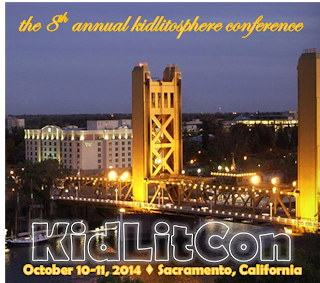
Charlotte Taylor, our program director, has clear Leadership Skillz, and came up with a great way to keep us thoughtful during those brief moments when people were at loose ends. She put a note pad up in the foyer space of the library, right next to one of the (oddly hidden) bathrooms, and put pens out. Just… a blank piece of paper, and some markers. And she wrote, “Ask some questions!” or something to that effect. And the weird thing is, people DID. Charlotte may have asked the first one, to get us started, but then other questions – and answers – and arrows appeared.
It was probably just as well that the pad of paper was on an easel. It made it harder to write super-long messages on. Maybe next time, we’ll cover a table with butcher paper and let the pen-and-question crew go to town.
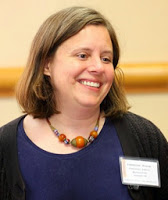 One of the questions was about how to support diversity within the kidlitosphere.
One of the questions was about how to support diversity within the kidlitosphere.
At first I thought the answer was obvious… to support diverse bloggers, follow them and comment, right? That’s how we support ANY bloggers. But then I thought about it…and realized I was maybe more confused by the question. To wit: does diversity need to be supported within the kidlitosphere? Online? Do I need to follow diverse bloggers specifically? Is that the best or only way to find diverse content?
I’m a diverse blogger as is AF… and it’s a weird thought to imagine that people are following this blog specifically because we’re non-white bloggers. (Is anybody doing that? Nobody is doing that, are they?) Here’s the thing:
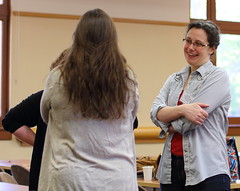 We here at Wonderland blog books. Period. If you’re coming to this blog to receive the AfAm and biracial Pakistani-American perspective on books… well, good luck with that. I don’t know that I give readers the African American perspective on…anything. I give visitors to the blog the Tanita perspective, which is obnoxious and opinionated and pretty much stabby sometimes. Sarah gives the knowledgeable and amusing, slightly snarky, mostly goofy, much-quieter-than-Tanita perspective, which is all her. None of that has to do with who we are by our labels, by our “groups.” Know that little thing Chimamanda Adichie said about The Danger of a Single Story? Yeah. There IS no differently-abled perspective. You already know there is no one gay or trans or bi perspective. There is no Pakistani-American or African American perspective. We don’t all have one diversity “experience,” and no matter how many times people go on about “the Black experience,” I honestly don’t know what that means.
We here at Wonderland blog books. Period. If you’re coming to this blog to receive the AfAm and biracial Pakistani-American perspective on books… well, good luck with that. I don’t know that I give readers the African American perspective on…anything. I give visitors to the blog the Tanita perspective, which is obnoxious and opinionated and pretty much stabby sometimes. Sarah gives the knowledgeable and amusing, slightly snarky, mostly goofy, much-quieter-than-Tanita perspective, which is all her. None of that has to do with who we are by our labels, by our “groups.” Know that little thing Chimamanda Adichie said about The Danger of a Single Story? Yeah. There IS no differently-abled perspective. You already know there is no one gay or trans or bi perspective. There is no Pakistani-American or African American perspective. We don’t all have one diversity “experience,” and no matter how many times people go on about “the Black experience,” I honestly don’t know what that means.
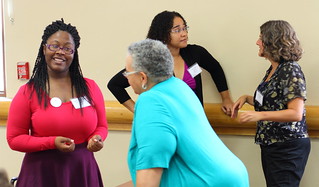 And, the danger of a single story is not only that sometimes simplistically written books or the media portrays people with one story but that we believe — it’s that on the other side of the fence, we think we’re the only ones put upon in a certain way, the only ones who understand certain things, and the only ones who feel a specific way. And pretty soon, we have lines in our heads and labels that say “Us” and “Them” and “They,” and we’re pulling back, just that tiny bit internally. You know what else this kind of “Us” and “Them” thing leads to? Segregation – which is just the polar opposite of the aims of true diversity. I’m not about to stay in “my” people’s camp, are you? True diversity is an invitation to broaden, not an excuse to limit.
And, the danger of a single story is not only that sometimes simplistically written books or the media portrays people with one story but that we believe — it’s that on the other side of the fence, we think we’re the only ones put upon in a certain way, the only ones who understand certain things, and the only ones who feel a specific way. And pretty soon, we have lines in our heads and labels that say “Us” and “Them” and “They,” and we’re pulling back, just that tiny bit internally. You know what else this kind of “Us” and “Them” thing leads to? Segregation – which is just the polar opposite of the aims of true diversity. I’m not about to stay in “my” people’s camp, are you? True diversity is an invitation to broaden, not an excuse to limit.
One of the things touched on briefly – really briefly – this weekend was identity struggle and imposter syndrome, how easily we feel un-genuine and how our insides don’t always match our outsides, and we forget who the world perceives us to be when we speak out on various issues. It’s easy to make assumptions based on stereotype and then be looked at at just some Angry Brown Person – easily dismissed because the assumption is that someone else has the shorthand explanation on our “experience.” Eh, no. Let’s not make that mistake here. While we have differences in where we’ve come from, we’re all in this together – let’s not assume or summarize, underestimate or dismiss.
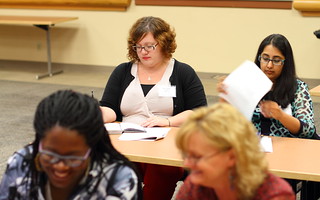 YES, we view life through the lens of our privilege and our background, but each of us has our own set of lenses. My privilege is not yours. My myriad hang-ups are not yours. My sense of smell, love of snakes, unwieldy hair, and clunky shoe tastes are not yours – why, then, would anyone expect our “experiences” to match? If you’re not coming here for the Sarah and Tanita Find Wonderland show, you’re out of luck. You can see things from the perspective of A Latina person, a biracial or transsexual or single or married or blue-shoe-loving person, but there’s never ever been any one tabula rasa onto which the “experience” of your or my specific group is written… and there never will be.
YES, we view life through the lens of our privilege and our background, but each of us has our own set of lenses. My privilege is not yours. My myriad hang-ups are not yours. My sense of smell, love of snakes, unwieldy hair, and clunky shoe tastes are not yours – why, then, would anyone expect our “experiences” to match? If you’re not coming here for the Sarah and Tanita Find Wonderland show, you’re out of luck. You can see things from the perspective of A Latina person, a biracial or transsexual or single or married or blue-shoe-loving person, but there’s never ever been any one tabula rasa onto which the “experience” of your or my specific group is written… and there never will be.
So, do you need to support me in the Kidlitosphere because I’m sharing something specifically here as an African American? Not to my mind. But, you tell me. What do you think?
Interesting stuff, Tanita. As always. I am pretty sure that I didn't even know that you and Tanita were "diverse" when I started reading your blog. I remember getting comments from "TadMack" on my blog, and I'm not sure I even knew you were female 😉 I follow you both because I appreciate your different voices, and because I've developed friendships with both of you over time.
That said, I DO sometimes follows blogs like, say, Latinos in Kid Lit so that I can hear their perspectives on diverse books and publishing and the like. But the way it works for me is that I may initially follow a blog because I have reason to believe it is going to reflect some diverse perspective. However, I will only continue to follow the blog if I find what the bloggers there are saying is worthwhile. I'm not going to follow some blog that annoys me or where there is excessive navel-gazing or whatever just because it is diverse.
This isn't so different from how I handle any blog, I guess. I decide to follow because something piques my interest, and I keep following if I get enough interesting content to make that blog worth my time.
Make sense?
Hi Tanita!
I was thinking when I wrote that question that I wanted to see at future Kidlitcons, ones that didn't have a specific future on diversity, the same or an even more diverse, mix of people. I was thinking about diverse bloggers who couldn't come, and wanting to make sure that these future cons were both appealing and accessible. I was wondering how to encourage Teens of Color, or gay teens, or other teens identifying strongly with some element of diverse identity to pick up their keyboards and start writing about books. And I was wanting to put in people's heads the idea that if they were to look around a conference, or a blogging community online, and see mostly people who were mirrors of themselves, to question why that should be the case.
I have absolutely no answers….except that it would be weird to comment on people's blogs because of who they were, as opposed to because of what they wrote, so that's not the right answer…
and maybe this is the wrong question? or one that only hints at a bigger question(s)?
@Jen: Hm, true. PROBABLY for something like books which highlight another culture, and blogs in which it's in their title and blogging charter that their whole goal and purpose is to highlight their culture, then it makes sense to follow that blog if that's what you're looking for. Thank you for helping me make sense of my own answer. ☺
@Charlotte: Thank you for the correction; there was EVERY chance that I'd misunderstood the question. I wasn't sure if it meant online or in person or what.
We WERE mostly Caucasian, cisgendered, ablebodied and straight at the KidlitCon this time, true… and accessible and appealing is something tangible and realistic at which to shoot… starting to get the word out sooner this next time about who we are, where we'll be and what we're doing. We thought we'd given ourselves a good lead-up this last time, but I think we need someone whose job is strictly PR. A thought for the list of "things to do next time."
They're all great questions, Charlotte…In fact, I don't think it's the wrong question at all–rather, as long as we keep asking these questions, at least thinking about them and not ignoring them, it's the right thing to do.
This was a great post, Tanita. I actually often wonder if people assume I am NOT diverse (that whole "default assumption" thing) if they don't know my background (or, uh, haven't looked at a picture).
I have always enjoyed you guys for being you guys. Y'all for being y'all. You know what I mean. I am sure that everything you are, including your race and background, influences what you write, and that's how I know you: by your writing! (ONE day we will all meet!) At any rate, I am here because I have long admired both of you as writers.
@Tanita–this one was By Far the most diverse of all the Kidlitcon's I have ever been to. It would be great if somehow we could make next year's even more so.
Maybe even have more men.
Susan, wish you could have been there, too!! Someday we'll meet in person. 🙂 Maybe next year in Baltimore.
Charlotte, yes, more men would be good…sadly, I couldn't convince Ian Lendler to stick around for Saturday (though I did get a very nice email from him after the Con).
I started reading this blog because it's labeled "The WritingYA Weblog," and writing YA is what I do.
At first, I kind of thought TadMack was a guy, and I had no clue who Aquafortis was, and whether male or female. Eventually I got to know who you both are. The reason I keep hanging around is for the book and writing discussions. And the toons!
I think–hope–the diversity discussion is expanding from diversity being a topic in itself, to diversity being a lens through which we address all other topics. That is, not just "Diverse books" as a topic, but, "Diverse perspectives on violence in YA." "Diverse perspectives on parental characters in MG." "Diverse views of [every topic we ever discuss in the children's lit field]."
I think right now there is still too much of this being viewed as an end in itself: "Oh, we have a panel on diversity, so we should make sure to have diverse authors on it," and then that being the only session where the diversity of the panelists is considered–rather than striving for diversity on all the panels and in all the sessions. (I'm not talking about Kidlitcon here; I'm speaking more generally.) And honestly, this isn't unique to kidlit either. In other workplaces and society generally, diversity is something people like to talk about as its own special topic in its own special slot.
Gah, I'm long-winded!
@Susan T: I think the entirety of who we are certainly informs what we write – I think if we can be taken as ALL of what we are, that makes more sense… if you know what I mean.
@Charlotte: Oh, wow. MEN. That would be amazing… and, yeah. I looked back at pictures of the 2007 KidlitCon, and I think there was maybe A single person of color there. So, we've come a long way, baby. And have a bit more to go…
@Jennifer Hubbard: Aww! I'm honored you thought I was a guy! I don't know why, but that's awesome! And, I take your point about the application of perspective — that would, indeed, be an amazing thing to have in terms of applying those different viewpoints to everything in children's lit. A very good point.